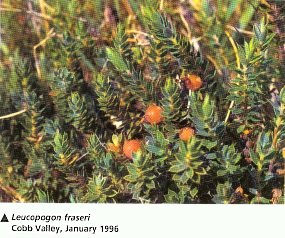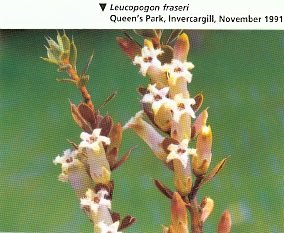|
 Alpine
Plants Alpine
Plants
of New Zealand
Leucopogon
fraseri
Patotara
Family
EPACRIDACEAE
 Reproduced
from Reproduced
from
Alpine Plants of New Zealand
ISBN 0 7900 0525 5
by kind permission of the author, Lawrie Metcalf and Reed Publishing
(NZ) Ltd
Publication or other use of images or descriptive
text on these pages is unauthorised unless written permission is
obtained from the author and publisher. Appropriate acknowledgement
of the publication Alpine Plants of New Zealand must always
be given.
Description
- A small, low-growing
shrub with creeping, underground stems, often forming quite extensive
patches. The wiry stems are usually 5-15 cm tall and clothed for
much of their length with foliage.
- Leaves: 4-9
mm long and 1-3 mm wide, quite hard of texture and the tip is
abruptly narrowed to a fine but pungent point. Their upper surface
is deep green, greyish, or yellowish- to bronzy green.
- Flowers:
White, produced from the leaf axils along the stem, strongly honey-scented,
1-1.3 cm long, with five distinctly bearded lobes at the mouth
of the tube.
- Fruits: Orange,
8-9 mm long.
 Distribution
& Habitat Distribution
& Habitat
- North, South and Stewart
Islands in coastal to low-alpine regions throughout. Sea level
to 1600 metres.
- Usually common in
dry places in coastal dune hollows, low tussock grasslands, rocky
places and fellfields.
Notes
- Identification:
The leaves can be quite prickly to the touch, which is often the
first indication of its presence amongst other low vegetation.
- Fruits: Edible
and have a sweetish if somewhat resinous taste. L. fraseri
often has a long flowering season and both flowers and fruit can
be seen on plants at the one time
Web-notes:
Alpine Garden Links
On
this site
Reproduced from Alpine Plants
of New Zealand:
Also see the article
by Raymond Mole on:
New Zealand Alpine Plants: A Challenge for
Growers
 External
Links External
Links
New
Zealand Alpine Garden Society
More
Plant Profiles
|



 Reproduced
from
Reproduced
from Distribution
& Habitat
Distribution
& Habitat